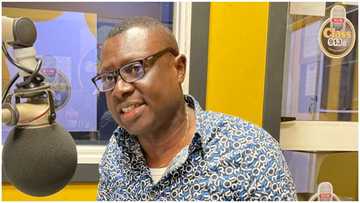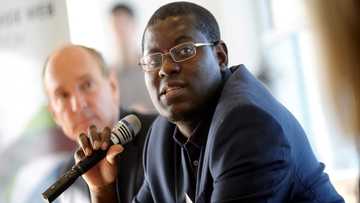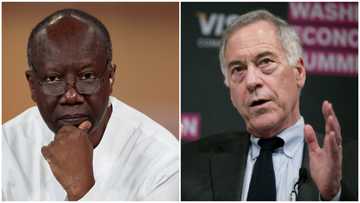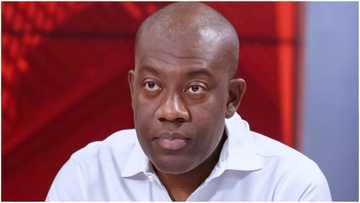IMF Bail-Out: Akufo-Addo's Free SHS And Other Social Interventions Could Take A Hit, According to Economists
- President Nana Akufo-Addo has put up a strong face to deny possible hits that his revenue-guzzling policies would take over the IMF bail-out decision
- Two economists see a different scenario, they believe there would be important modifications, especially to the Free SHS
- YEN.com.gh presents two economists' views about the possible effects of the bail out on Free SHS and other costly social intervention programmes
New feature: Check out news exactly for YOU ➡️ find “Recommended for you” block and enjoy!
While government spokespersons have been stressing that its flagship programmes like the Free Senior High School (SHS) will not be affected by a possible International Monetary Fund (IMF) bail-out programme, economists say that is denying the obvious.
Interestingly, the announcement to seek IMF assistance is a viable example of "denying the obvious" under this administration. While it was a big deal for mainstream media when the Nana Akufo-Addo-led administration announced on July 1, 2022, that a firm decision had been taken to engage the IMF for balance of payment support, many experts had seen it coming.

Source: Facebook
That is why a bold statement published on the Presidency's Facebook page that Free SHS and other policies will not be affected sounds like a political gimmick to many. Two economists, Professor Lord Mensah and Haruna Alhassan, expect that policies that, over the years, have become bottomless pits for scarce state funds would be on the IMF negotiating table.
PAY ATTENTION: Click “See First” under the “Following” tab to see YEN.com.gh News on your News Feed!
Major modifications to Free SHS
Haruna Alhassan, a Fellow of think tank, Centre for Social Justice (CSJ), told YEN.com.gh in an exclusive interview that as part of the IMF negotiations, all major expenditure lines of the government will come under scrutiny.
"Because the solutions to Ghana's macroeconomic instability will be driven by the government's proposals, the effect on social intervention programmes will be determined by how the government is able to demonstrate their importance to the economic development of the country," he said.
He noted that reviewing social intervention policies to make them more targeted and efficient will be in the government's interest.
"There currently exists a lot of inefficient resource utilisation in the execution of some of these social programmes," he stressed.
According to him, the Free SHS, the biggest social intervention programme of Nana Akufo-Addo will not be spared because of deep-seated challenges.
"Even before the country approached the IMF for support, a number of ordinary Ghanaians, educational experts and local CSOs including CSJ called for a review of that intervention. Other intervention programmes like the Planting for Food and Jobs as well as NABCO have not yielded results that justify the volume of resources spent on them," he said.
The Fellow on the CSJ's Finance and Economics Pillar thinks the Free SHS will be on the table for review because of the country's huge resources used to maintain it. According to the government's budget, implementation of Free SHS costs the nation an estimated GH¢2.4billion per annum.
"Outright cancellation is not anticipated. A modification is more likely," Mr Alhassan said.
IMF must target the size of the government
While sharing similar sentiments on the fate of social intervention programmes, Associate Professor at the Department of Finance of the University of Ghana Business School (UGBS), Legon, Lord Mensah, wants the IMF to read between the lines during negotiation.
Prof Mensah has urged the Fund not to target the low-hanging fruits like public workers' salaries, employment or taxes.
"IMF must target the size of government and not target the usual public sector workers and introduce taxes," he told YEN.com.gh during a phone interview.
In his view, the size of the government constitutes a significant waste of state resources that an IMF programme cannot ignore.
On a brighter note, he observed that Ghana was going to the negotiating table with a bit of an advantage because of the Electronic Transactions Levy (E-Levy).
"E-Levy is a good revenue-enhanced measure to reassure the IMF," he said.
He said the existence of the E-Levy in Ghana's books, even if it was not bringing in the projected revenue, is good because it would water down the austerity attached to an IMF bail out programme for Ghana.
It has been a tough second term for President Akufo-Addo and his appointees in delivering on the promises that won them power in 2016 and 2020. However, with IMF in the picture, perhaps the remaining two years of their tenure would usher in the redeeming grace they badly need.
Akomea Advises government to include Seth Terkper in IMF negotiations
Meanwhile, YEN.com.gh reported that a leading NPP member has advised the government to include former minister Seth Terkper in the team negotiating with the IMF.
Nana Akomea said the former minister under the opposition National Democratic Congress (NDC) government has experience as a former staff of the Fund and as someone who led a similar negotiation in 2015.
Mr Akomea said an efficient negotiation team with the International Monetary Fund should be national in feature.
New feature: Check out news exactly for YOU ➡️ find "Recommended for you" block and enjoy!
Source: YEN.com.gh






